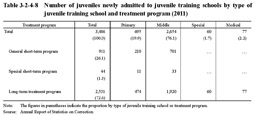2 Treatment of juvenile probationers/parolees
The treatment for juvenile probationers and juvenile training school parolees is basically the same as that for probationers and parolees excluding that for specified violent offenders, specialistic treatment programs, and interim treatment system (See Subsection 2, Section 2, Chapter 5, Part 2), but with the following measures also being implemented.
(1) Categorized treatment
The categorized treatment system is also introduced for juvenile probationers/juvenile training school parolees (See (3) b. (a) of Subsection 2, Section 2, Chapter 5, Part 2). With juvenile probationers, however, the categorized treatment system does not apply to those subjected under short-term probation for traffic offenses and short-term probation but does when it is deemed necessary to keep them subjected under probation even after completion of the term of short-term probation by changing the type of probation from short-term to long-term.
Table 3-2-5-6 shows the number of juvenile probationers/juvenile training school parolees by major treatment categories as of the end of 2011.
Table 3-2-5-6 Number of juvenile probationers/juvenile training school parolees by major treatment categories (as of December 31, 2011)
(2) Treatment of juveniles who have committed heinous/serious offenses
Juvenile probationers and juvenile training school parolees who committed heinous/serious offenses such as homicide, in many cases, have problems related to their predisposition and complex serious problems with family relationships, etc. They are therefore placed at the highest level of the graduated treatment with the intensive involvement of probation officers to aid their development of the ability to adapt to society and facilitate them to apologize to their victims by providing them with atonement guidance program, etc. (See (3) b. (c) of Subsection 2, Section 2, Chapter 5, Part 2).
(3) Treatment through specialistic treatment programs
Juvenile probationers and juvenile training school parolees are not obliged to receive treatment through specialistic treatment programs, as probationers and parolees are, but specialistic treatment programs can be implemented for them on a voluntary basis (See (3) b. (b) of Subsection 2, Section 2, Chapter 5, Part 2).
(4) Social contribution activities/social participation activities
Social contribution activities have been implemented since FY 2011 as part of the treatment involved in probation/parole supervision that also apply to adults in thereby helping them to acquire a sense of self-efficacy and develop greater moral awareness, and the ability to adapt to society through continued participation in social activities which benefit their local society, including cleaning activities at public places and care assistant activities at welfare facilities (See (6) of Subsection 2, Section 2, Chapter 5, Part 2). In FY 2011 a total of 266 social contribution activities took place in which a total of 625 juveniles (356 juvenile probationers and 72 juvenile training school parolees) participated (Source: The Rehabilitation Bureau, Ministry of Justice).
In addition, social participation activities have been implemented mainly for juvenile probationers/juvenile training school parolees with the aim of fostering a more appropriate social nature and enhancing their ability to adapt to society by encouraging them to participate in cleaning activities at public places and care assistant activities at welfare facilities, pottery classes and cooking classes, farm work, sports activities, and recreational activities, etc. In FY 2011 a total of 341 social participation activities took place. Frequently implemented activities included “participating in cleaning and environmental beautification activities” (118 times), “participating in nursing care for the elderly, etc. and volunteer activities” (105 times), and “participating in creative activities, hands-on experience, and various classes, etc.” (58 times), and which ultimately involved a total of 970 juvenile probationers/juvenile training school parolees and a total of 142 custodians/family members (Source: The Rehabilitation Bureau, Ministry of Justice).
(5) Employment support, etc.
Systematic employment support has also been implemented for juvenile probationers/juvenile training school parolees. The National Center for Offender Job Training and Employment Support (Numata-cho), which accommodates juvenile training school parolees, etc. who intend to engage in agriculture, and with the aim of providing employment support through instruction/supervision and agricultural training, has been in operation since October 2007 (See (7) of Subsection 2, Section 2, Chapter 5, Part 2).
(6) Measures for custodians
Probation offices have been providing the custodians of juvenile probationers and juvenile training school parolees with instruction or advice until the juvenile probationer or juvenile training school parolee of concern reaches 20 years of age in thus ensuring that they provide the appropriate supervision through thorough understanding of their living conditions, etc. and rectify their behavior that could obstruct their reformation/rehabilitation, making information that contributes to solving problems pertaining to their delinquency available through holding meetings of custodians, etc.
